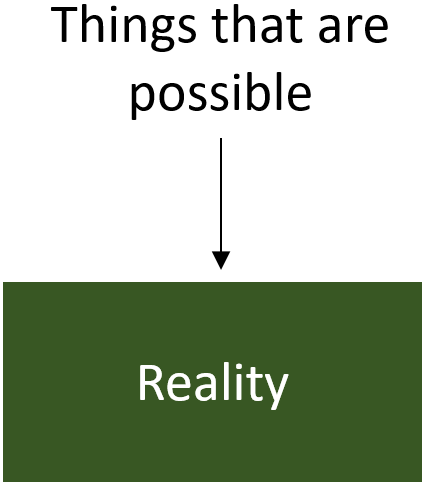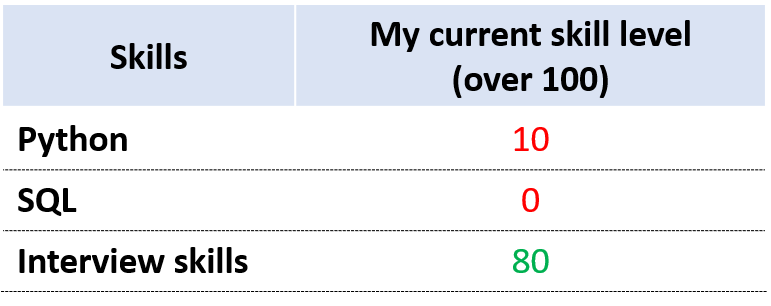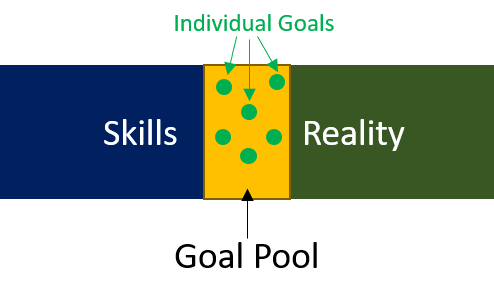Chapter 3: Making a game plan and taking action
Since I made a career switch to data analytics, the most common question I get is “So how do you start learning data analytics and what resources did you use?”.
These people often have a desire to learn but when push comes to shove they stick to their current roles. When I dig a little deeper, the main reason that causes most people to not take action is uncertainty. I get it. There are huge trade-offs and risks to switch careers and we rightly should be cautious.
Let’s digest a strategy to switch careers. As with all big problems, breaking into down into bite-sized pieces reduces uncertainty by making it many easy small problems. We’re then are much more likely take action.
Let’s start.
What is a game plan
The game plan starts off simple, with our Skills box.

This box contains the skills you need to be a data analyst. The skills you require depend on the type of data analyst role that you’re applying for. There is a breakdown of requisite skills below, but here are some examples:

A sibling to the Skills box is the Reality box. This represents your proficiency in each skill.

Filling the reality box is next. This requires a clear picture of what skills companies are looking for, and your current ability for each skill.

The overlap of the Skills and Reality boxes is your goal pool. This is where all your goal options reside.

How do you be a data analyst? You pick one goal from the goal pool and start working to change your reality. You change reality by directing resources to your chosen goal. Resources come in various forms: energy, time, network, money and so on.
Once you choose a goal, you’ll know the direction in which to direct your resources. But we also want to improve our skill proficiency as quickly as possible - that’s your strategy.

It’s simple right? This is probably how you think intuitively. But it’s still important to divide the game plan into unrelated boxes and tackle each one box at a time. In this way, you’ll avoid feeling burdened with too much to do and not knowing where to start. Clarity lowers the activation energy needed to take action. Action brings results.
Writing your game plan
It’s worth spending a good chunk of time carefully writing your game plan. Going in the wrong direction can be a huge drain on your time and money. So let’s start.
Fill in the Skills box
Filling in the Skills box requires a deep understanding on what companies look for in a data analyst. It’s important to draw a distinction here. Your want to be hired as a data analyst. But to be hired, you’ll have to satisfy your future employers’ wants. So what you really want is to have the skills that make an excellent data analyst. You want to be so good that they can’t ignore you.
Let’s look at what skill employers look out for. Skills are broadly split into two - hard skills and soft skills.
Hard skills can be objectively measured, for example by doing a coding test or through technical interview questions. Soft skills are less tangible but no less important. Soft skills make you human and help you stand out from the crowd.
| Hard Skills | Why it’s needed |
|---|---|
| Coding | Manipulate datasets, build automation scripts |
| SQL | Pull data from databases |
| Visualisation tools (e.g. Tableau, Looker) | Create dashboards for business |
| Statistics | Design meaningful A/B tests |
| Microsoft word (Excel, ppt etc..) | Quick n’ dirty analysis on excel. Design presentations and reports on PPT and Word |
| Soft Skills | Why it’s needed |
|---|---|
| Clear thinking | To solve a problem, break it down and identify root causes. Only then the right solution can be proposed. Clear thinking helps you do that |
| Communication | Insights without the buy in from the business is moot. Communicate to influence, and you’ll demonstrate value |
| Meticulous | A tiny error in your code results in wrong data being pulled. Wrong data can lead drastically wrong conclusions |
| Scepticism | Question implicit assumptions, get more robust conclusions |
| Curiosity | It’s crucial to ask the right questions to be targeted in the exploration. Asking the right questions tackle the root of the issue, but yet you don’t need to boil the entire ocean |
So now the Skills box is filled. The skills above are the foundation of an excellent data analyst, and will apply to most data analyst roles.
In the later chapters, we’ll talk about excellent resources and strategy to acquire the skills above. But for now, let’s move on to the reality box.
Fill in the reality box
The Reality box is your current rank versus other interview candidates. This rank is different for each skill. Grades range from 0 to 100, with 100 being an expert. Grading yourself is important, as it tells you where you are and how much more time and effort you have to invest. Here is how to grade yourself.
Grading Hard skills
For hard skills, an expert means having both the breath and depth. You know many concepts, and are able to explain complicated concepts to people like they are 5 years old.
If you started Python 2 weeks ago, chances are you score 10 marks in the Python row. But if you have been using excel for years with all the varying functions, you’ll likely score yourself 90.
Grading Soft skills
We tend to neglect soft skills, as they are less tangible and so are much harder to codify. But soft skills make you human; Soft skills show interviewers that you are not just another data monkey. Thinking critically and communicating well is how people judge “smartness”. This is your edge over super technical people.
For example, a data monkey can be proficient in Python but bad at critical thinking.
A data monkey can be the best at SQL, but not have any business understanding. Data without context is dangerous.
Here, the goal is to draw the clearest possible picture of the actual facts about your own abilities so you know which ones to work on. This requires deep and honest reflection about yourself.
For example, chances are that you rank low in meticulousness if other people point out your mistakes that easily could have been prevented. Also, you can observe the habit of giving a second or third glance before submitting your work is something that is cultivated.
You’re likely sceptical if you constantly ask “why” and not just accept concepts and dogma, even from authority figures. A litmus test of scepticism is having the habit of reasoning from first principles. Here’s how Elon Musk explains first principles:
I think generally people’s thinking process is too bound by convention or analogy to prior experiences. It’s rare that people try to think of something on a first principles basis. They’ll say, “We’ll do that because it’s always been done that way.” Or they’ll not do it because “Well, nobody’s ever done that, so it must not be good.” But that’s just a ridiculous way to think. You have to build up the reasoning from the ground up—“from the first principles” is the phrase that’s used in physics. You look at the fundamentals and construct your reasoning from that, and then you see if you have a conclusion that works or doesn’t work, and it may or may not be different from what people have done in the past.
In science, this means starting with what evidence shows us to be true. A scientist doesn’t say, “Well we know the Earth is flat because that’s the way it looks, that’s what’s intuitive, and that’s what everyone agrees is true,” a scientist says, “The part of the Earth that I can see at any given time appears to be flat, which would be the case when looking at a small piece of many differently shaped objects up close, so I don’t have enough information to know what the shape of the Earth is. One reasonable hypothesis is that the Earth is flat, but until we have tools and techniques that can be used to prove or disprove that hypothesis, it is an open question.”
Apply the same process for communication and being curious.
Once the reality box is filled, you’ll have a goal pool which represents all of your possible goals.
Your Strategy
You filled out the Skills and Reality boxes above. Together, the Skills and Reality box gives you a goal pool. You’ll now need to implement a strategy - this means charting a path that help you achieve your goals the fastest.
The most important skill
Remember the Skills box with hard and soft skills? There is one more skill type, and it’s arguably more impactful than both hard and soft skills.
Learning how to learn is a meta skill, and you should learn how to learn before picking up hard and soft skills. Knowing this skill compounds your time - you’ll learn exponentially quicker and what you learn will stick. It won’t matter if you’re picking up python, SQL, or a Nguni Bantu language with click consonants. Learn how your brain learns, and how to stay focused and procrastinate less. This helps you reach your goal to be a data analyst faster.
Learning how to learn
Experts have dedicated their lives to studying how we learn, and my role here is to guide you to the best resources. Think of learning how to learn as an investment, and put in the time to learn this skill. Once you become good, this skill compounds for the rest of your life. This skill applies whether you’re learning on a new job, learning new web technologies, or learning a new language just for the heck of it.
Learning how to learn can be broken down into three parts: Learning how our brain processes and retains information, focus, and building good habits. The best resources I’ve come across for each part are listed below.
A Mind For Numbers: How to Excel at Math and Science (Even If You Flunked Algebra): This is THE bible of learning how to learn. I’ve read this book thrice, and will read it again without hesitation. The title promises improvements in math and science, but the concepts are applicable to all forms of learning and problem solving.
This book is perfect if:
- You want to learn anything quicker and make it stick
- You have trouble focusing
- You get distracted and procrastinate easily
Book here
Coursera course here
Deep Work: Rules for Focused Success in a Distracted World: To learn hard things quickly, you must focus intensely without distraction. Deep work is the ability to focus without distraction in a cognitively demanding task.
In contrast, shallow work is non-cognitive demanding, logistical tasks, often done while distracted. Shallow work tends to not create much value and is easy to replicate.
The writer, Cal Newport states his deep work hypothesis:
The ability to perform deep work is becoming increasingly rare at exactly the same time it is becoming increasingly valuable in our economy. As a consequence, the few who cultivate this skill, and then make it the core of their working life, will thrive.
Newport makes the book extremely practical. He gives tips on how to win the war of attention. It’s not about saying “no” to trivial distractions; But saying heck yes to a small number of ambitious outcomes to pursue with your deep work hours. One such tip is implementing the four disciplines of execution (4DX):
- Focus on the Wildly Important
- Act on the Lead Measures
- Keep a Compelling Scoreboard
- Create a Cadence of Accountability
He also talks about the importance of downtime, the principle of least resistance, and busyness as proxy for productivity.
You can find the book here.
Atomic Habits: An Easy & Proven Way to Build Good Habits & Break Bad Ones: Habits are the compound interest that propels you in your data analyst journey. If you want better results, focus on your systems instead of goals. Goals point you to where you should go. Systems is the vehicle that drives you to achieve the results.
Outcomes are a lagging measure of your habits, and hence you should be more concerned with your current trajectory than with your current results. Build good habits, and time will be your ally through compounding.
The writer, James Clear, talks about the four laws of behaviour change, which are a simple set of rules we can use to build better habits. They are (1) make it obvious, (2) make it attractive, (3) make it easy, and (4) make it satisfying.
This is an insanely practical book. The author examines how humans tick, and suggests ways we can use our common quirks to build good habits.
Amazon book link here.
We’ve made a game plan. Let’s now get down to learning about data.